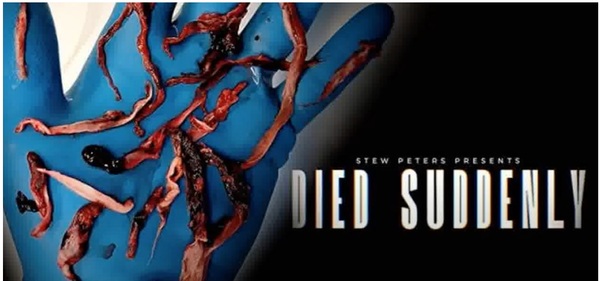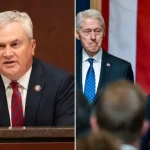
–>
February 13, 2023
A new and increasingly popular Twitter hashtag is “#diedsuddenly” in response to a surge of sudden unexplained deaths among mostly young and healthy individuals, including athletes, occurring over the past 2 years. Here are but a few recent news stories.
‘); googletag.cmd.push(function () { googletag.display(‘div-gpt-ad-1609268089992-0’); }); }
In Australia, “Fit and healthy 21 year old son dies suddenly in his sleep.” From the University of Arizona, “A recent member of Arizona’s men’s swim team has unexpectedly passed away.” In Detroit, a high school basketball player suffered a cardiac arrest during a basketball game. While they restarted his heart, he hasn’t woken up.
Or this athlete in his early 20’s, “A former Florida Gators offensive lineman died suddenly on Thursday night according to multiple media reports.” From the US Army, “A soldier stationed at Fort Stewart died Tuesday while traveling to California for a training exercise.” Is this some type of black magic? Not likely, “America’s Got Talent magician suddenly dies at just 52.”
Let’s not forget Buffalo Bills player Damar Hamlin going into cardiac arrest after an unremarkable tackle during a January NFL game. These are anecdotes, and while compelling are not the same as collected data.
‘); googletag.cmd.push(function () { googletag.display(‘div-gpt-ad-1609270365559-0’); }); }
Several brave researchers recorded these “sudden” and “unexplained” deaths, as they are described in the media. Here is one report, “An investigation of official statistics has found that the number of athletes who have died since the beginning of 2021 has risen exponentially compared to the yearly number of deaths of athletes officially recorded between 1966 and 2004.”
This trend was quite worrisome, “So much so that the monthly average number of deaths between January 2021 and April 2022 is 1,700% higher than the monthly average between 1966 and 2004.”

YouTube screen grab
Where are the 3-letter health agencies? Why haven’t the FDA, NIH, or CDC offered their own data to refute this alleged increase in sudden deaths? If this is all “misinformation” as big tech and the corporate media describes it, the health agencies should easily be able to disprove it, rather than calling on social media giants to censor or ban anything contrary to their “safe and effective” mantra.
Big Medicine and the media attempt to play this all off as normal but average Americans are noticing and are understandably concerned. Since when is it “normal” for high school and college athletes to have heart attacks and blood clots, often fatal? Why are these daily news stories now compared to years ago when one might hear of only a few cases per year, typically attributed to a previously undiagnosed congenital heart defect? Why are these deaths frequently “unexplained” leaving “doctors mystified”?
America has the best medical care in the world and few medical maladies remain “unexplained” in 2023, other than the recent surge in sudden deaths among the young and healthy.
Are people noticing? Rasmussen Reports asked Americans what they think about all of this. In a national telephone and online survey of 1000 adult Americans published a month ago, four questions were asked.
- Have you received a COVID-19 vaccination?
- How likely is it that side effects of COVID-19 vaccines have caused a significant number of unexplained deaths?
- Do you personally know anyone whose death you think may have been caused by side effects of COVID-19 vaccines?
- Which is closer to your belief, that there are legitimate reasons to be concerned about the safety of COVID-19 vaccines, or that people who worry about vaccine safety are spreading conspiracy theories?
‘); googletag.cmd.push(function () { googletag.display(‘div-gpt-ad-1609268078422-0’); }); } if (publir_show_ads) { document.write(“
How did they answer? 71% of those surveyed were vaccinated, comparable to the national average. Virtually half of respondents don’t believe the “disinformation” mantra propagated by “fact checkers”, mainstream media, and the government. “49% of American adults believe it is likely that side effects of COVID-19 vaccines have caused a significant number of unexplained deaths, including 28% who think it’s very likely.”
Furthermore, “28% of adults say they personally know someone whose death they think may have been caused by side effects of COVID-19 vaccines.” And “48% of Americans believe there are legitimate reasons to be concerned about the safety of COVID-19 vaccines.”
The 2022 film “Died Suddenly” reinforces the above concerns, despite critics describing the movie as “baseless”, “propaganda”, or “pseudoscience”. Maybe it is, maybe not. If this is all nonsense, it should be as easy to disprove as it would be to dispel the notion that the sun orbits the earth, rather than vice versa.
Why doesn’t the CDC do a simple analysis, as Steve Kirsch has suggested, linking death and vaccination records? Kirsch has even offered a 10X return on a bet anyone wants to make with him disproving his analysis or conclusions. Any takers?
Since COVID-19 began 3 years ago, trust in medical authorities has declined. According to Pew Research, “29% of U.S. adults say they have a great deal of confidence in medical scientists to act in the best interests of the public, down from 40% who said this in November 2020.”
Much of what we have been told over the past few years has turned out to be false. A recent Cleveland Clinic study found that more vaccine doses lead to a greater likelihood of getting COVID-19. Or a Cochrane analysis concluding that masks in the community made “little to no difference” in COVID-19 infections or deaths. Weren’t we told otherwise by authoritative doctors in white coats? Challenges to the approved party line were met with threats to one’s medical license, job, or reputation.
Someday there will be another public health emergency and it would behoove health authorities to set the record straight, either proving their assertions, or admitting they were wrong and thoughtfully analyzing why. Otherwise, they will have little future credibility, much like the boy who cried wolf.
Brian C Joondeph, MD, is a physician and writer. He is not “anti-vaccine”, having been vaccinated against COVID-19 and he is not offering any medical advice, which should take place in a discussion between patients and their physicians.
Follow me on Twitter @retinaldoctor
Truth Social @BrianJoondeph
LinkedIn @Brian Joondeph
<!– if(page_width_onload <= 479) { document.write("
“); googletag.cmd.push(function() { googletag.display(‘div-gpt-ad-1345489840937-4’); }); } –> If you experience technical problems, please write to [email protected]
FOLLOW US ON
<!–
–>
<!– _qoptions={ qacct:”p-9bKF-NgTuSFM6″ }; ![]() –> <!—-> <!– var addthis_share = { email_template: “new_template” } –>
–> <!—-> <!– var addthis_share = { email_template: “new_template” } –>






